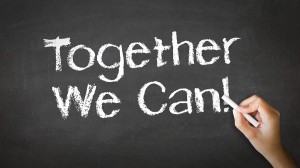When I first started my journey in recovery one of the things I was most excited about was the fact that I would be working with a team. I had my counsellor, a dietician and at the beginning was part of St. Paul’s out-patient program. I find it funny that since going into my own practice I have not given as much thought to creating a team for my clients to work with. When they come in I am so focused on what I can do to help that I guess I have lost sight of the parts of recovery I can’t facilitate. After a meeting today with Julia Raudzus, the medical director of St Paul’s Eating Disorder Unit, it reminded me of how a team can help facilitate change and support a client in ways that no one person can do alone.
Initially the idea of it scared me: How will I recommend someone that I genuinely feel safe having my clients go to? How can I protect them if a team member says something that causes more pain? Once I got myself and my needs out of the way (I know people are resilient and not fragile but I must admit I am rather protective of my  clients), I realized that this is something everyone should consider. In other words, the question I think everyone should ask themselves is “What can I manage on my own and what do I need help with?”
clients), I realized that this is something everyone should consider. In other words, the question I think everyone should ask themselves is “What can I manage on my own and what do I need help with?”
What I see frequently in my practice with restrictors is a thorough understanding of the calories in food but not necessarily understanding of what a healthy balanced meal really looks like. With my emotional eaters they know what diets tell them to eat but often struggle with trusting themselves to make healthy balanced decisions. Both usually have a hard time listening to their bodies and trusting what it’s telling them. Usually those who I see are similar to how I was in that they struggle to really understand their emotions and thoughts, often have destructive relationships with self and typically come in with high anxiety. Some of my clients have great support networks outside of counselling, others have none.
My point with all of this is really taking the time to focus on yourself and realize what you may need to recover. Knowing what your strengths and weaknesses are with this will allow you to set yourself up for success by hopefully asking for help in the places you most need it. Perhaps what is most crucial is counselling and for many that is all that is needed. For others, having additional support whether that be a dietician, a group or an inpatient program can help clarify what steps we need to take next. It can be scary reaching out for support from different people (including personal support from friends and professional support), both because it may actually increase our chances for recovery and giving up our eating disorder can feel really vulnerable and because it can be overwhelming tackling things from different angles.
What I really recommend is you take time to think about where you could most use the support. Is it from a counsellor? A dietician? A support group? Regular follow ups with your doctor? All of the above? By knowing this you will give yourself the best chance to really beat your eating disorder once and for all. It takes a lot of courage to reach out and ask for support. Doing so will make you stronger, healthier and happier.
Wishing you wellness in your journey


